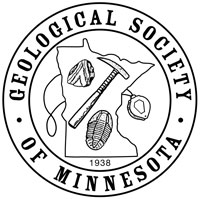The Geological Society of Minnesota was started in the late 1930s when two separate but similar educational groups merged. One was an earth science club that had met regularly at the Minneapolis Public Library, The other was a group led by Edward P. Burch, from Minneapolis, who was a consulting engineer that had taken up an avid study of the geology of the Twin Cities area. During the years when Minneapolis was endeavoring, without success, to have the Milwaukee Railroad depress its main line tracks through south Minneapolis, Mr. Burch undertook an independent study of the problem. The proposed construction involved extensive excavation and required accurate knowledge of the rock formations under the city. This led to a study of deep well records of the Twin City artesian basin and to field inspection of rock exposures in the Twin Cities area. Mr. Burch invited others to join in the project, with the result that regular weekly field trips were conducted to study the geology of the area.
In 1938, the combined groups organized the Geological Society of Minnesota for the purpose of stimulating public interest in geology, and the Society began a year‑round program of lectures and field trips to which the public was invited free of charge. In 1939, GSM was incorporated as a Minnesota nonprofit educational organization.
In 1949, an extensive geological markers project was started which aimed, in a limited way, to describe the geology of Minnesota in such a manner that it would develop interest by residents as well as visitors to the state. This was accomplished by the installation of bronze tablets at carefully chosen locations on state highway property and in city and state parks.
Since about 1950, the winter lectures have been held at the University of Minnesota. Over the years, many outstanding geologic professionals have given the lectures. Lecturers are from the University of Minnesota and other academic institutions, government agencies, engineering firms, and industry.
In about 1960, an educational exhibit was started at the Minnesota State Fair, which spreads interest to a broad spectrum of fair attendees, who also receive a program of the upcoming year's lecture series.
